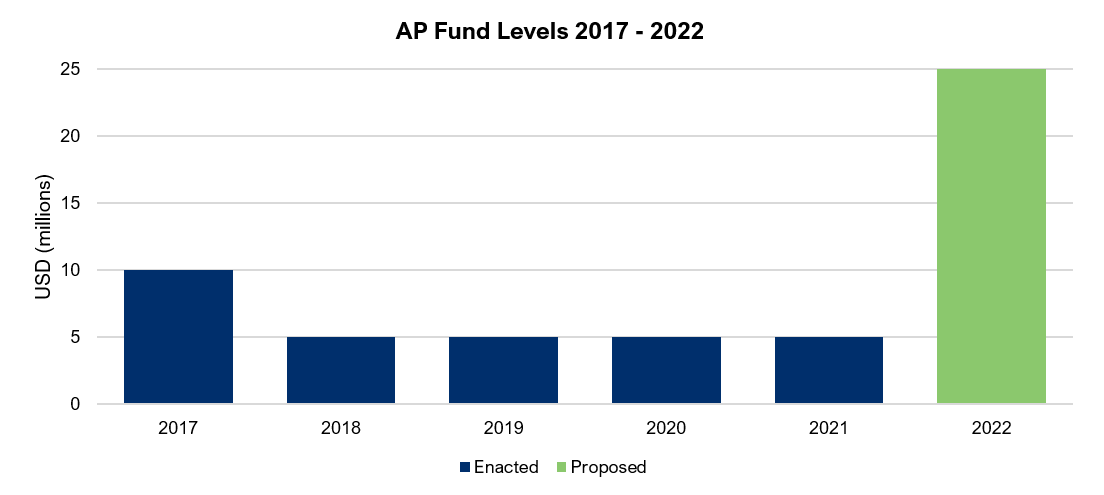The Atrocities Prevention Fund (AP Fund) provides resources to the Department of State for the prevention of genocide and mass atrocities, including by acting on the recommendations of the Atrocity Early Warning Task Force. The AP Fund is critical to the implementation of the Elie Wiesel Genocide and Atrocities Prevention Act (P.L. 115-441).
Background
The AP Fund was created by the 115th Congress in 2017 to allow the administration to respond to the early warning signs of mass atrocities. After an initial appropriation of $10 million in FY17, funding has remained stagnant at $5 million since FY18. The State Department’s Bureau of Democracy, Human Rights, and Labor (DRL) manages the AP Fund and provides small grants to local and international peacebuilding organizations in around half a dozen countries.
The AP Fund is the only funding mechanism entirely dedicated to responding to the early warning signs of genocide and mass atrocities, in order to prevent violence and save lives.
Atrocities Prevention Fund in Action
Central African Republic: Beginning in FY19, the AP Fund has supported efforts to equip remote communities with high-frequency radios, allowing neighboring communities to form a network and share critical information on security threats from non-state armed groups, such as the Lord’s Resistance Army, and to coordinate responses. Additionally, the program trains communities on conflict resolution techniques, enabling them to address long-standing tensions that often drive local violence between pastoralists and farmers.
Guinea: With combined resources from the AP Fund and funding for transitional justice initiatives that promote accountability for genocide, crimes against humanity, and war crimes, a consortium of NGOs works with survivors, educators, and local civil society to address trauma from past atrocities and to identify early warning signs of future atrocities or communal violence. Using an arts-based healing method, survivors draw images of their experiences and trauma onto ‘body maps.’ These body maps are then shown in public exhibitions and accompanied by educational programs about past atrocities and how to prevent future violence.
Expand the Atrocities Prevention Fund
With widening violence against civilians, fueled by rising authoritarianism and violence by non-state armed groups as well as the COVID-19 pandemic and the effects of climate change, the AP Fund’s annual appropriation has been insufficient to meet global needs. Recent analysis predicts that, between 2020 and 2022, the expected number of countries with internal violent conflict will spike to its highest levels since the end of the Cold War.
To meet this challenge, DRL has been using transitional justice funds to support AP efforts. While this may be a creative solution to the budgetary shortfall, it highlights the need to increase the appropriation for the AP fund and expand the reach of AP efforts. We urge no less than $25 million be appropriated to the AP Fund in FY22.
We request that no less than $25 million be appropriated to the Atrocities Prevention Fund in FY22.
The AP Fund is the only funding mechanism entirely dedicated to the prevention of genocide and mass atrocities. Prevention is not only significantly more cost effective than response; it is more ethical and humane.
Selected Atrocities Prevention Fund Programs
Zimbabwe
Start Year: 2017
Amount: $3,000,000
Purpose: This program educated a coalition of Zimbabwean faith-leaders and communities on how to document and report atrocity early warning signs. The ensuing reports helped inform locally-led responses and were shared by the implementing NGO with the State Department – providing vital local intelligence on events that could lead to rising violence. Reporting focused on both predictable events leading to instability (e.g. electoral violence, transitions of power) and unpredictable events (crop failure).
Central African Republic
Start Year: 2019
Amount: $1,090,000
Purpose: This program empowers local communities in the eastern region of CAR to form local peace committees that devise solutions to local and regional challenges. These committees not only coordinate between neighboring communities on peace and security concerns but also have grown to address shared economic and development matters. This program supports the Crisis Tracker online mapping platform, which monitors instances of conflict, abduction, murder, or other violent events and has informed U.S. officials and policy in the region.
Guinea
Start Year: 2019
Amount: $500,000
Purpose: This program allows victims of past violence to tell their stories in art exhibitions, through which community members learn of past atrocities that are not publicly spoken of or are inaccurately taught in schools. As a result of misinformation on past atrocities, tensions between groups continue and there is an increased risk of future violence. The program also hosted town hall meetings with influential community and religious leaders across ethnic divides to discuss ways to prevent violence stemming from a controversial constitutional referendum.
Central African Republic
Start Year: 2020
Amount: $900,000
Purpose: This program aims to break cycles of violence through education of ‘peace mentors’ in Bangui and Bambari. It is implemented in partnership with two locally-led, Bangui-based organizations and the National Youth Council of the Central African Republic (CNJCA). The CNJCA promotes civic education and literacy among young people and supports reconciliation activities of the Peace Mentors Network and the Platform of Religious Denominations.
This piece was updated by Ursala Knudsen-Latta in April 2021, from a 2020 version originally authored by Daren Caughron.


